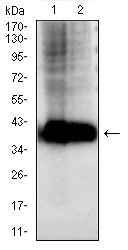
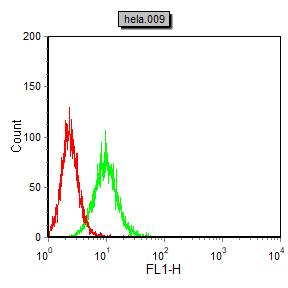
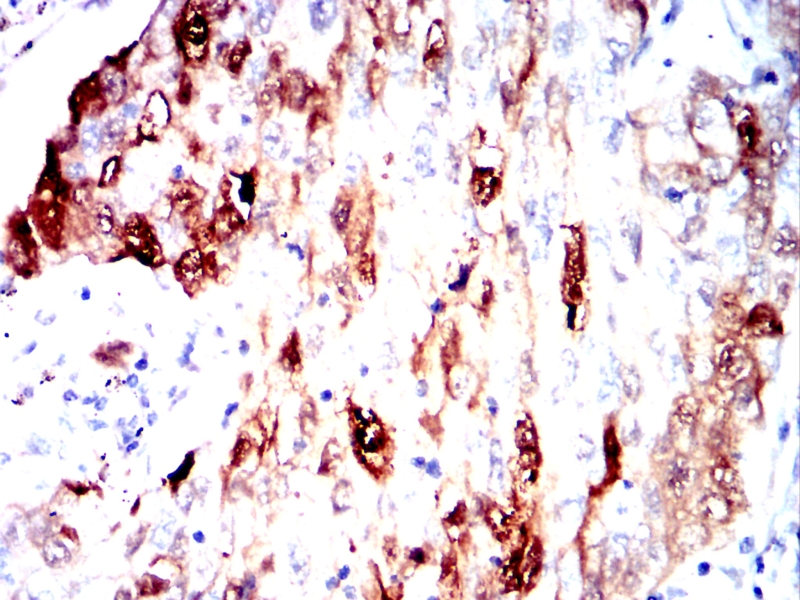
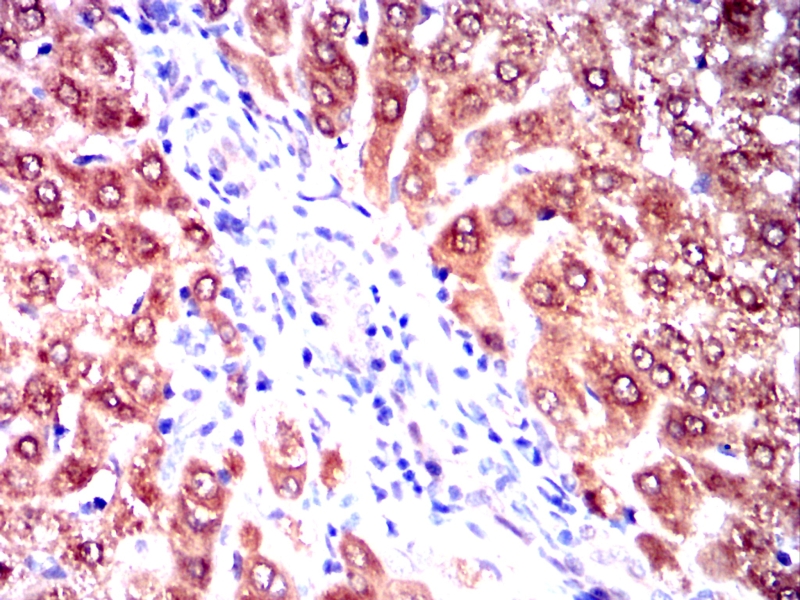
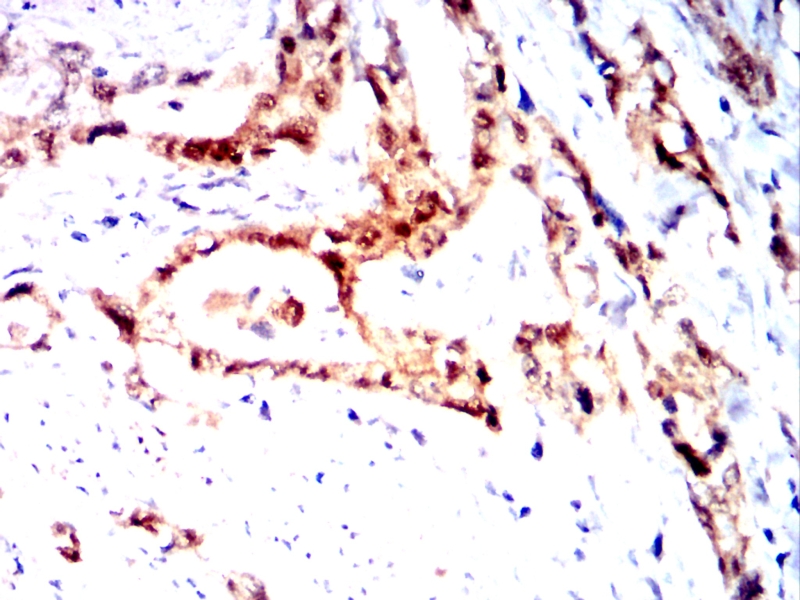
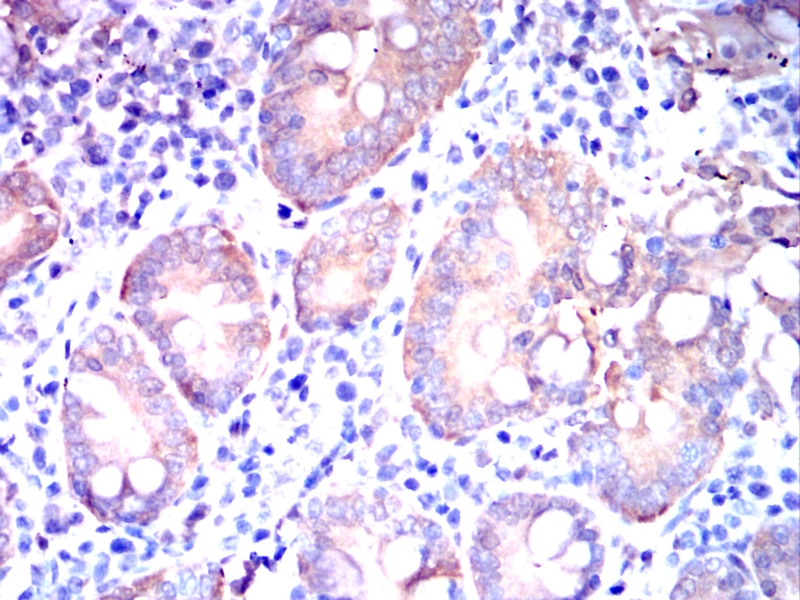
| WB | 1/500-1/1000 | Human,Rabbit |
| IF | 咨询技术 | Human,Rabbit |
| IHC | 1/200-1/400 | Human,Rabbit |
| ICC | 技术咨询 | Human,Rabbit |
| FCM | 1/200 - 1/400 | Human,Rabbit |
| Elisa | 咨询技术 | Human,Rabbit |
| Aliases | C9;DD1;DDH;DDH1;H-37;HBAB;MBAB;HAKRC;DD1/DD2;2-ALPHA-HSD;20-ALPHA-HSD |
| Entrez GeneID | 1645 |
| clone | 8C12B11 |
| WB Predicted band size | 36.8kDa |
| Host/Isotype | Mouse IgG1 |
| Antibody Type | Primary antibody |
| Storage | Store at 4°C short term. Aliquot and store at -20°C long term. Avoid freeze/thaw cycles. |
| Species Reactivity | Human,Rabbit |
| Formulation | Purified antibody in PBS with 0.05% sodium azide |
+ +
以下是3篇与AKR1C1抗体相关的文献示例(内容为模拟生成,建议通过学术数据库验证准确性):
---
1. **文献名称**: "AKR1C1 expression in hormone-resistant prostate cancer and its regulation by androgen receptor signaling"
**作者**: Smith J, et al.
**摘要**: 研究通过免疫组化(使用AKR1C1特异性抗体)发现,AKR1C1在前列腺癌耐药组织中高表达,其表达水平与雄激素受体(AR)信号通路激活相关,提示AKR1C1可能作为治疗耐药性癌症的潜在靶点。
---
2. **文献名称**: "Role of AKR1C1 in chemoresistance: Insights from immunohistochemical analysis in breast cancer"
**作者**: Chen L, et al.
**摘要**: 该研究利用AKR1C1抗体对乳腺癌组织样本进行染色,发现AKR1C1过表达与化疗药物(如阿霉素)耐药性显著相关,机制可能与AKR1C1介导的药物代谢及氧化应激调控有关。
---
3. **文献名称**: "Development of a monoclonal antibody against AKR1C1 for quantitative analysis in human liver tissues"
**作者**: Tanaka K, et al.
**摘要**: 报道了一种高特异性抗AKR1C1单克隆抗体的开发,并通过Western blot和免疫荧光验证其在人肝组织中的定量检测能力,为研究AKR1C1在药物代谢中的功能提供了可靠工具。
---
4. **文献名称**: "AKR1C1 as a biomarker for endometrial cancer progression detected by antibody-based proteomics"
**作者**: Wang Y, et al.
**摘要**: 结合抗体芯片技术和AKR1C1抗体,研究发现子宫内膜癌晚期患者组织中AKR1C1蛋白水平显著升高,提示其可作为癌症进展的生物标志物及治疗靶点。
---
建议通过PubMed或Google Scholar搜索实际文献(关键词:AKR1C1 antibody, immunohistochemistry, drug resistance)。
The AKR1C1 antibody is a key tool for studying the aldo-keto reductase family 1 member C1 (AKR1C1), an enzyme involved in steroid hormone metabolism and xenobiotic detoxification. AKR1C1. also known as 20α-hydroxysteroid dehydrogenase, catalyzes the reduction of prostaglandins, steroids, and ketones, regulating the bioavailability of hormones like progesterone and androgens. It plays roles in endocrine signaling, cell proliferation, and drug metabolism, with implications in hormone-dependent cancers (e.g., prostate, breast), metabolic disorders, and chemoresistance.
AKR1C1 antibodies are typically developed in hosts such as rabbits or mice, targeting specific epitopes of the 37 kDa protein. They enable detection and quantification of AKR1C1 expression in tissues and cell lines via techniques like Western blotting, immunohistochemistry, and immunofluorescence. Researchers use these antibodies to explore AKR1C1's involvement in disease mechanisms, including its overexpression in cancerous tissues linked to poor prognosis or therapy resistance. Additionally, they aid in evaluating AKR1C1's potential as a therapeutic target, particularly in modulating steroid metabolism pathways or enhancing chemosensitivity. Validation parameters, including specificity checks via knockout controls and cross-reactivity assessments, ensure reliability. Overall, AKR1C1 antibodies are vital for advancing research into hormonal regulation, cancer biology, and personalized treatment strategies.
×